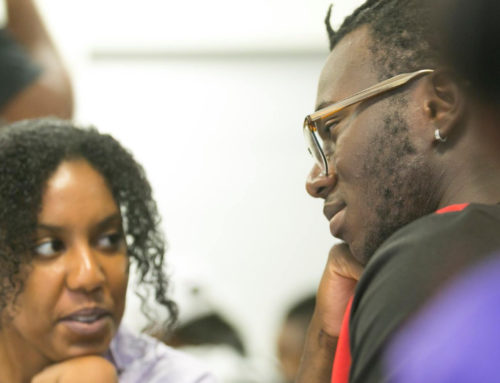CareerU with Ryan, Volume II
Have confidence in what you do and the decisions you make.
One of the key soft skills to develop is humbled confidence. Confidence is integral to success, but without humility, that confidence easily slips into overconfidence – and from there, leads to arrogance. Developing “humbled confidence” – being both humble and confident at the same time – will help you succeed in school, at work, and in your personal life, and will open doors that overconfidence cannot.
Being Humble
Let’s start with the idea of “being humble,” or humility. At its core, being humble is maintaining a level of modesty in everything you do. In your lifetime, you will have your fair share of successes: finishing a difficult semester, graduating college, landing a coveted interview, getting promoted, and more. You should absolutely celebrate your successes. These are sizable moments in your life that should be recognized and that you should feel good about. At the same time, though, you will want to hold onto humility and modesty. Without those, you can slip into arrogance.
Consider the following situation: Sarah is the top sales representative in her company. She is an expert at working with clients and drives the most revenue. Sarah meets with her boss one afternoon, and is promoted to Director of Sales, which she gladly accepts. As she leaves the meeting, Sarah skips down the hallway of the office, walks over to the nearest colleague, tells them the news and says “I should have had this promotion months ago. I’m the top producer, after all.” She then skips back to her desk, spreading the news to other colleagues in the same manner.
Sarah has every right to celebrate a well-deserved promotion. However, her actions are condescending to her coworkers. Her arrogant actions ultimately show her in a negative light. She is missing an essential part of celebrating her success: humility. This begins with viewing the promotion as an opportunity she is fortunate to have.
No matter the successes or failures in life, I like to keep things in perspective, understanding that my hard work has paid off and that I am in many ways lucky to have the opportunity to succeed at something, beginning with my education. If you are able to maintain this frame of mind, you will continue to be humble in everything you do in life, and can celebrate success in the right way.
Being Confident
Then, there is confidence. You should seek to and continuously work at doing everything with confidence. Easy, right? Absolutely not. It’s a long journey – one I take every day.
Confidence is your ability to deliver with certainty and trust. Just as you will have many successes in your life, you will experience let-downs, even failures along the way. Learning that you will sometimes fail, and having confidence in yourself that you will succeed despite that, is a display of confidence.
Thinking and acting as if you will never fail, however, is a sign of overconfidence. Consider the following situation: Bian attends a top, Ivy League university and is consistently in the top 5% of his class. He becomes increasingly confident in his ability to master and get an A in his biology major classes. As a senior, Brian decides to take a class outside of his major, Accounting 101. He spends most of the first class browsing the internet on his computer. As the semester goes on, he pays less and less attention in Accounting 101. He says to himself, “This is an entry level class. I aced Molecular Biology 301. How hard can Accounting be?” However, when the first test comes along, Brian soon realizes he is severely under prepared. His grade reflects this: he receives a C-.
The issue here is not that Brian took a course outside of his major, or even that he got a C-. It is that his
overconfidence in his academic abilities got in the way of his actions – in this case, doing the hard work required for the class. I like to lead with confidence, knowing where I excel and what value I can add to an activity or a
conversation, while also knowing my limitations. I recommend you ask questions when you feel unsure, rather than
pretending to know the answer or the right way forward. Pretending only leads to the swell of an “overconfidence
bubble” and someone will eventually uncover that you were in fact misrepresenting yourself.
Here are some ways to build confidence:
•Begin each morning with positive self-talk. Recite to yourself what you excel at, recent successes, or any other positive attributes about yourself that make you feel good about yourself. This is a great exercise to do with a mirror.
•Choose a task or activity each month that you want to improve on. Making small but incremental increases in
something new is an instant confidence builder.
•Practice expanding your network by meeting new people. Your ability to effectively communicate with others and to cultivate relationships over time will increase your confidence levels.
Confidence grows best with action. Taking small, achievable steps that increase your entire skill set – from writing to networking to physical activity to learning an instrument, and everything in between – will in turn increase your confidence and make you more effective in everything you do.
Humbled Confidence
So how do you meld being humble and being confident together? Start with humility and build off of that. The
following three steps are a great place to start:
1. Assess the current circumstances and think about the most extreme or excessive way you could approach it.
2. Tailor your approach away from the extremes to words and actions that are thoughtful and take into account those around you.
3. Reinforce your positive words and actions by delivering with certainty and inspiring a level of trust in those around you.
Mastering humbled confidence will help you succeed far more than overconfidence ever will. It is also contagious: by modeling humbled confidence, you will undoubtedly inspire others around you to behave in the same way.



